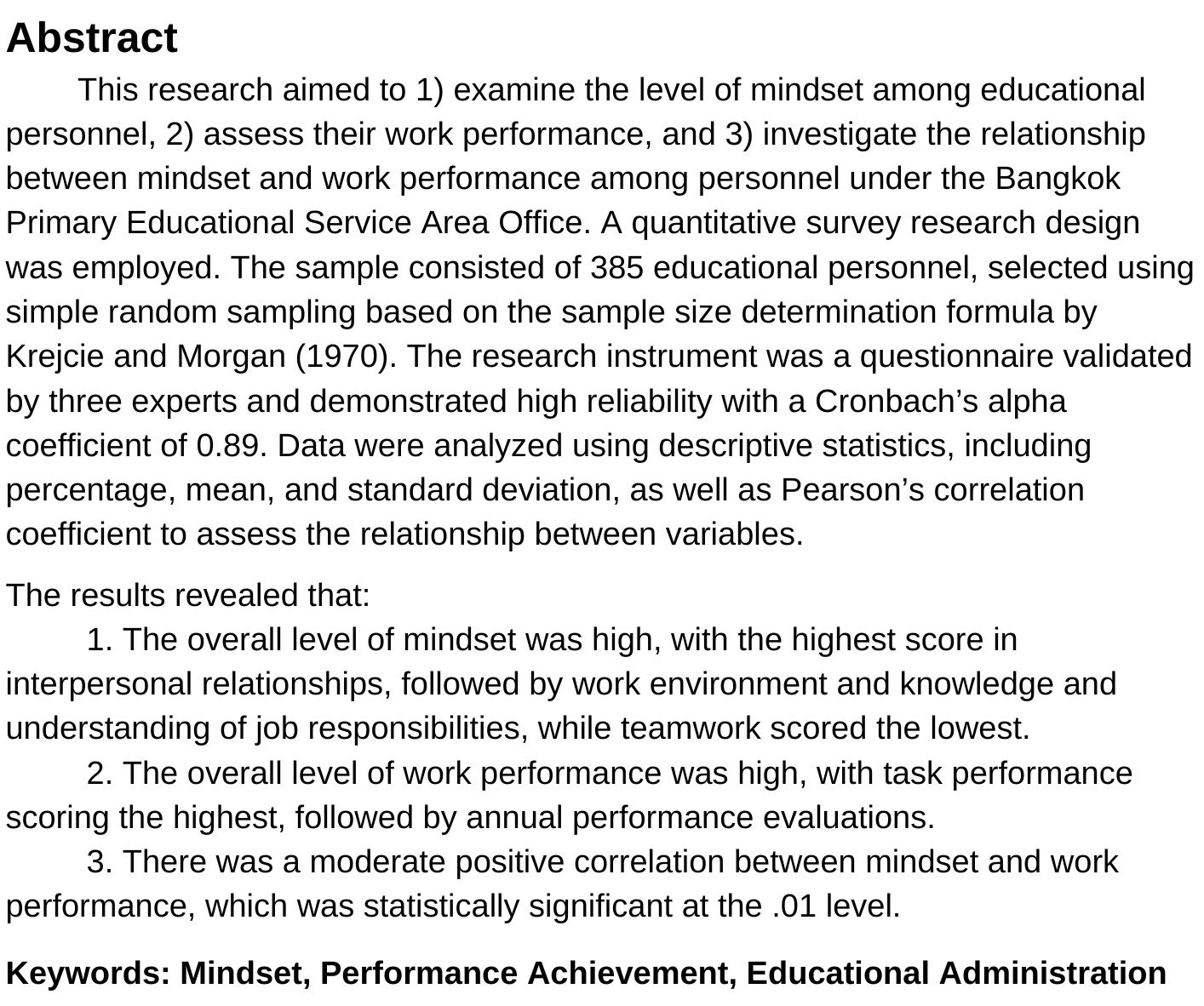Mindset and Performance Outcomes of Educational Personnel in the Bangkok Primary Educational Service Area Office
Keywords:
Mindset, Performance Achievement, Educational AdministrationAbstract
This research aimed to 1) examine the level of mindset among educational personnel, 2) assess their work performance, and 3) investigate the relationship between mindset and work performance among personnel under the Bangkok Primary Educational Service Area Office. A quantitative survey research design was employed. The sample consisted of 385 educational personnel, selected using simple random sampling based on the sample size determination formula by Krejcie and Morgan (1970). The research instrument was a questionnaire validated by three experts and demonstrated high reliability with a Cronbach’s alpha coefficient of 0.89. Data were analyzed using descriptive statistics, including percentage, mean, and standard deviation, as well as Pearson’s correlation coefficient to assess the relationship between variables.
The results revealed that:
- The overall level of mindset was high, with the highest score in interpersonal relationships, followed by work environment and knowledge and understanding of job responsibilities, while teamwork scored the lowest.
- The overall level of work performance was high, with task performance scoring the highest, followed by annual performance evaluations.
- There was a moderate positive correlation between mindset and work performance, which was statistically significant at the .01 level.
References
กฤษดา เชียรวัฒนสุข และคณะ. (2560). แรงจูงใจที่มีอิทธิพลต่อผลการปฏิบัติงานของพนักงาน กรณีศึกษา บริษัท ทีโอที จำกัด (มหาชน) สำนักงานใหญ่แจ้งวัฒนะ. วารสารวิจัยมหาวิทยาลัยเวสเทิร์น มนุษยศาสตร์และสังคมศาสตร์, 3(2), 29-43.
ธนภรณ์ พรรณราย. (2565). ปัจจัยที่ส่งผลต่อประสิทธิภาพในการปฏิบัติงานของบุคลากรองค์การบริหารส่วนจังหวัดสงขลา. สารนิพนธ์ปริญญารัฐประศาสนศาสตรมหาบัณฑิต. สาขาวิชารัฐประศาสนศาสตร์ : มหาวิทยาลัยสงขลานครินทร์.
ความสัมพันธ์ระหว่างกรอบคิดติดยึดและการรับรู้ความสามารถแห่งตนของนักเรียนนายร้อย. วารสารมนุษยศาสตร์และสังคมศาสตร์ นายเรืออากาศ, 10, 20–32. สืบค้นจาก https://so04.tci-thaijo.org/index.php/KANNICHA/article/view/258997
ประพันธ์ศิริ สุเสารัจ. (2556). การพัฒนาการคิด. (พิมพ์ครั้งที่ 5). กรุงเทพฯ : ห้างหุ้นส่วนจำกัด 9119 เทคนิค พริ้นติ้ง.
มุทิตา อดทน. (2561). ศึกษาผลของโปรแกรมการพัฒนากรอบความคิดเติบโตในนักเรียนชั้นมัธยมศึกษาตอนปลาย. วารสารการวัดผลการศึกษา มหาวิทยาลัยมหาสารคาม, 24(2), 182-194.
อภิชยา จรรยาศรี. (2566). มรรรถนะของผู้บริหารกับการปฏิบัติงานของครูตามมาตรฐานวิชาชีพครูสังกัดสำนักงานเขตพื้นที่การศึกษามัธยมศึกษา กรุงเทพมหานคร เขต 1. วิทยานิพนธ์ศึกษาศาสตรมหาบัณฑิต. สาขาวิชาการบริหารการศึกษา : มหาวิทยาลัยศิลปากร.
อังศวีร์ เครือแก้ว. (2562). กรอบความคิด กับผลสัมฤทธิ์การปฏิบัติงาน กรณีศึกษา บุคลากรสายสนับสนุนภายใต้สำนักงานมหาวิทยาลัย จุฬาลงกรณ์มหาวิทยาลัย. การค้นคว้าอิสระ รัฐประศาสนศาสตรมหาบัณฑิต. คณะคณะรัฐศาสตร์ : จุฬาลงกรณ์มหาวิทยาลัย. สืบค้นจาก https://digital.car.chula.ac.th/chulaetd/7135
Dweck, C.S. (2012). Mindset: How You Can Fulfil Your Potential. Constable & Robinson, London.
Krejcie, R.V. and Morgan, D.W. (1970). Determining Sample Size for Research Activities. Educational and Psychological Measurement, 30(3), 607–610.
Rovinelli, R. J., & Hambleton, R. K. (1977). On the use of content specialists in the assessment of criterion-referenced test item validity. Tijdschrift voor Onderwijsresearch, 2(2), 49–60.

Downloads
Published
How to Cite
Issue
Section
License
Copyright (c) 2025 Institute of Sufficiency Journal

This work is licensed under a Creative Commons Attribution-NonCommercial-NoDerivatives 4.0 International License.



